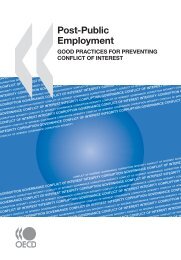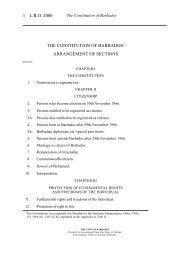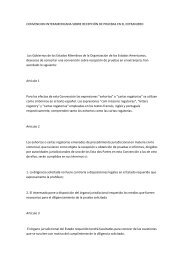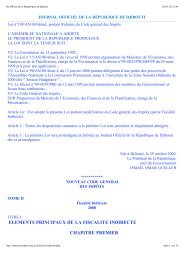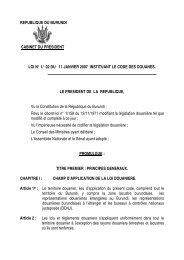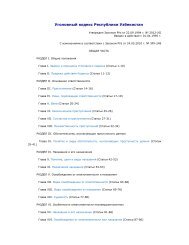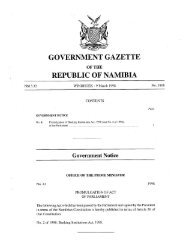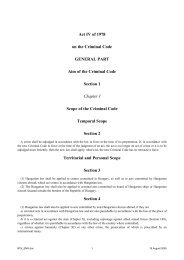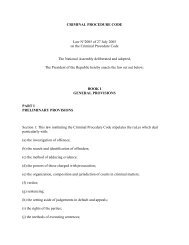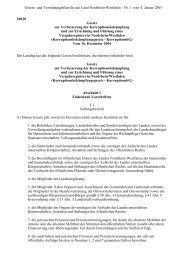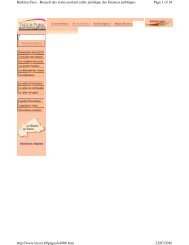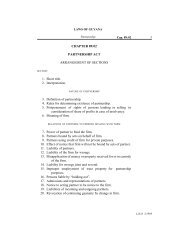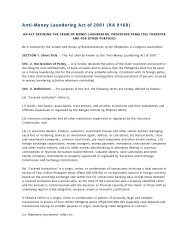Saudi Arabia Basic Law of Saudi Arabia 1993 - On TRACK against ...
Saudi Arabia Basic Law of Saudi Arabia 1993 - On TRACK against ...
Saudi Arabia Basic Law of Saudi Arabia 1993 - On TRACK against ...
Create successful ePaper yourself
Turn your PDF publications into a flip-book with our unique Google optimized e-Paper software.
The law defines means <strong>of</strong> exploiting, protecting, and developing such wealth in the interests <strong>of</strong> thestate, its security and economy.Article 15No privilege is to be granted and no public resource is to be exploited without a law.Article 16Public money is sacrosanct. The state has an obligation to protect it and both citizens and residentsare to safeguard it.Article 17Property, capital, and labor are essential elements in the Kingdom's economic and social being. Theyare personal rights which perform a social function in accordance with Islamic Shari'ah.Article 18The state protects freedom <strong>of</strong> private property and its sanctity. No one is to be stripped <strong>of</strong> hisproperty except when it serves the public interest, in which case fair compensation is due.Article 19Public confiscation <strong>of</strong> money is prohibited and the penalty <strong>of</strong> private confiscation is to be imposedonly by a legal order.Article 20Taxes and fees are to be imposed on a basis <strong>of</strong> justice and only when the need for them arises.Imposition, amendment, revocation and exemption is only permitted by law.Article 21Alms tax is to be levied and paid to legitimate recipients.Article 22Economic and social development is to be achieved according to a just and scientific plan.Chapter 5 Rights and DutiesArticle 23 IslamThe state protects Islam; it implements its Shari'ah; it orders people to do right and shun evil; itfulfills the duty regarding God's call.Article 24 Holy PlacesThe state works to construct and serve the Holy Places; it provides security and care for those whocome to perform the pilgrimage and minor pilgrimage in them through the provision <strong>of</strong> facilities andpeace.
Article 25 World PeaceThe state strives for the achievement <strong>of</strong> the hopes <strong>of</strong> the Arab and Islamic nation for solidarity andunity <strong>of</strong> word, and to consolidate its relations with friendly states.Article 26 Human RightsThe state protects human rights in accordance with the Islamic Shari'ah.Article 27 Welfare RightsThe state guarantees the rights <strong>of</strong> the citizen and his family in cases <strong>of</strong> emergency, illness anddisability, and in old age; it supports the system <strong>of</strong> social security and encourages institutions andindividuals to contribute in acts <strong>of</strong> charity.Article 28 WorkThe state provides job opportunities for who-ever is capable <strong>of</strong> working; it enacts laws that protectthe employee and employer.Article 29 Science, CultureThe state safeguards science, literature and culture; it encourages scientific research; it protects theIslamic and Arab heritage and contributes toward the Arab, Islamic and human civilization.Article 30 EducationThe state provides public education and pledges to combat illiteracy.Article 31 Health CareThe state takes care <strong>of</strong> health issues and provides health care for each citizen.Article 32 Environment, NatureThe state works for the preservation, protection, and improvement <strong>of</strong> the environment, and for theprevention <strong>of</strong> pollution.Article 33 Armed ForcesThe state establishes and equips the Armed Forces for the defence <strong>of</strong> the Islamic religion, the TwoHoly Places, society, and the citizen.Article 34 Military ServiceThe defence <strong>of</strong> the Islamic religion, society, and country is a duty for each citizen. The regimeestablishes the provisions <strong>of</strong> military service.Article 35 CitizenshipThe statutes define the Regulations governing <strong>Saudi</strong> <strong>Arabia</strong>n nationality.Article 36 Arrest
The state provides security for all its citizens and all residents within its territory and no one shall bearrested, imprisoned, or have their actions restricted except in cases specified by statutes.Article 37 HomeThe home is sacrosanct and shall not be entered without the permission <strong>of</strong> the owner or be searchedexcept in cases specified by statutes.Article 38 Punishment, nulla poenaPenalties shall be personal and there shall be no crime or penalty except in accordance with theShari'ah or organizational law. There shall be no punishment except for acts committed subsequentto the coming into force <strong>of</strong> the organizational law.Article 39 ExpressionInformation, publication, and all other media shall employ courteous language and the state'sregulations, and they shall contribute to the education <strong>of</strong> the nation and the bolstering <strong>of</strong> its unity. Allacts that foster sedition or division or harm the state's security and its public relations or detract fromman's dignity and rights shall be prohibited. The statutes shall define all that.Article 40 CommunicationTelegraphic, postal, telephone, and other means <strong>of</strong> communications shall be safeguarded. Theycannot be confiscated, delayed, read or listened to except in cases defined by statutes.Article 41 Residents' DutiesResidents <strong>of</strong> the Kingdom <strong>of</strong> <strong>Saudi</strong> <strong>Arabia</strong> shall abide by its laws and shall observe the values <strong>of</strong><strong>Saudi</strong> society and respect its traditions and feelings.Article 42 Asylum, ExtraditionThe state shall grant the right to political asylum when the public interest demands this. Statutes andinternational agreements shall define the rules and procedures governing the extradition <strong>of</strong> commoncriminals.Article 43 Royal CourtsThe King's Court and that <strong>of</strong> the Crown Prince shall be open to all citizens and to anyone who has acomplaint or a plea <strong>against</strong> an injustice. Every individual shall have a right to address the publicauthorities in all matters affecting him.Chapter 6 The Authorities <strong>of</strong> the StateArticle 44The authorities <strong>of</strong> the state consist <strong>of</strong> the following: the judicial authority;the executive authority;the regulatory authority.
These authorities cooperate with each other in the performance <strong>of</strong> their duties, in accordance withthis and other laws. The King shall be the point <strong>of</strong> reference for all these authorities.Article 45The source <strong>of</strong> the deliverance <strong>of</strong> fatwa in the Kingdom <strong>of</strong> <strong>Saudi</strong> <strong>Arabia</strong> are God's Book and theSunnah <strong>of</strong> His Messenger. The law will define the composition <strong>of</strong> the senior ulema body, theadministration <strong>of</strong> scientific research, deliverance <strong>of</strong> fatwa and it's (the body <strong>of</strong> senior ulema's)functions.Article 46The judiciary is an independent authority. There is no control over judges in the dispensation <strong>of</strong> theirjudgements except in the case <strong>of</strong> the Islamic Shari'ah.Article 47The right to litigation is guaranteed to citizens and residents <strong>of</strong> the Kingdom on an equal basis. Thelaw defines the required procedures for this.Article 48The courts will apply the rules <strong>of</strong> the Islamic Shari'ah in the cases that are brought before them, inaccordance with what is indicated in the Book and the Sunnah, and statutes decreed by the Rulerwhich do not contradict the Book or the Sunnah.Article 49Observing what is stated in Article 53, the courts shall arbitrate in all disputes and crimes.Article 50The King, or whoever deputizes for him, is responsible for the implementation <strong>of</strong> judicial rulings.Article 51The authorities establish the formation <strong>of</strong> the Higher Council <strong>of</strong> Justice and its prerogatives; theyalso establish the seniority <strong>of</strong> the courts and their prerogatives.Article 52The appointment <strong>of</strong> judges and the termination <strong>of</strong> their duties is carried out by Royal decree by aproposal from the Higher Council <strong>of</strong> Justice in accordance with the provisions <strong>of</strong> the law.Article 53The law establishes the seniority <strong>of</strong> the tribunal <strong>of</strong> complaints and its prerogatives.Article 54The law establishes the relationship between the investigative body and the Prosecutor-general, andtheir organization and prerogatives.
Article 55The King carries out the policy <strong>of</strong> the nation, a legitimate policy in accordance with the provisions <strong>of</strong>Islam; the King oversees the implementation <strong>of</strong> the Islamic Shari'ah, the system <strong>of</strong> government, thestate's general policies; and the protection and defence <strong>of</strong> the country.Article 56The King is the head <strong>of</strong> the Council <strong>of</strong> Ministers; he is assisted in carrying out his duties by members<strong>of</strong> the Council <strong>of</strong> Ministers, in accordance with the provisions <strong>of</strong> this and other laws. The Council <strong>of</strong>Ministers establishes the prerogatives <strong>of</strong> the Council regarding internal and external affairs, theorganization <strong>of</strong> and co-ordination between government bodies. It also establishes requirements to befulfilled by ministers, their prerogatives, the manner <strong>of</strong> their questioning and all issues concerningthem. The law on the Council <strong>of</strong> Ministers and its prerogatives is to be amended in accordance withthis law.Article 57Article 58(a) The King appoints and relieves deputies <strong>of</strong> the prime minister and ministers andmembers <strong>of</strong> the Council <strong>of</strong> Ministers by Royal decree.(b) The deputies <strong>of</strong> the prime minister and ministers <strong>of</strong> the Council <strong>of</strong> Ministers areresponsible, by expressing solidarity before the King, for implementing the IslamicShari'ah and the state's general policy.(c) The King has the right to dissolve and reorganize the Council <strong>of</strong> Ministers.The King appoints those who enjoy the rank <strong>of</strong> ministers, deputy ministers and those <strong>of</strong> higher rank,and relieves them <strong>of</strong> their posts by Royal decree in accordance with the explanations included in thelaw. Ministers and heads <strong>of</strong> independent departments are responsible before the prime minister forthe ministries and departments which they supervise.Article 59The law defines the rules <strong>of</strong> the civil service, including salaries, awards, compensations, favors andpensions.Article 60The King is the commander-in-chief <strong>of</strong> all the armed forces. He appoints <strong>of</strong>ficers and puts an end totheir duties in accordance with the law.Article 61The King declares a state <strong>of</strong> emergency, general mobilization and war, and the law defines the rulesfor this.Article 62If there is a danger threatening the safety <strong>of</strong> the Kingdom or its territorial integrity, or the security <strong>of</strong>its people and its interests, or which impedes the functioning <strong>of</strong> the state institutions, the King may
take urgent measures in order to deal with this danger And if the King considers that these measuresshould continue, he may then implement the necessary regulations to this end.Article 63The King receives Kings and Heads <strong>of</strong> State. He appoints his representatives to states, and hereceives the credentials <strong>of</strong> state representatives accredited to him.Article 64The King awards medals, as defined by regulations.Article 65The King may delegate prerogatives to the Crown Prince by Royal decree.Article 66In the event <strong>of</strong> his travelling abroad, the King issues a Royal decree delegating to the Crown Princethe management <strong>of</strong> the affairs <strong>of</strong> state and looking after the interests <strong>of</strong> the people, as defined by theRoyal decree.Article 67The regulatory authority lays down regulations and motions to meet the interests <strong>of</strong> the state orremove what is bad in its affairs, in accordance with the Islamic Shari'ah. This authority exercises itsfunctions in accordance with this law and the laws pertaining to the Council <strong>of</strong> Ministers and theConsultative Council.Article 68 Consultative CouncilA Consultative Council is to be created. Its statute will specify how it is formed, how it exercises itspowers and how its members are selected.Article 69The King has the right to convene the Consultative Council and the Council <strong>of</strong> Ministers for a jointmeeting and to invite whoever he wishes to attend that meeting to discuss whatever matters hewishes.Article 70International treaties, agreements, regulations and concessions are approved and amended by Royaldecree.Article 71Statutes are to be published in the Official Gazette and take effect from the date <strong>of</strong> publication unlessanother date is specified.Chapter 7 Financial AffairsArticle 72
Article 73(a) The statute explains the provisions concerning the state's revenue and its entry in thestate's general budget.(b) revenue is entered and spent in accordance with the rules specified in the statute.Any undertaking to pay a sum <strong>of</strong> money from the general budget must be made in accordance withthe provisions <strong>of</strong> the budget. If it is not possible to do so in accordance with the provisions <strong>of</strong> thebudget, then it must be done in accordance with Royal decree.Article 74The sale, renting or use <strong>of</strong> state assets is not permitted except in accordance with the statute.Article 75The statutes will define the monetary and banking provisions, the standards, weights and measures.Article 76The law will fix the state's financial year and will announce the budget by way <strong>of</strong> a Royal decree. Itwill also assess the revenues and expenditure <strong>of</strong> that year at least one month before the start <strong>of</strong> thefinancial year. If, for essential reasons, the budget is not announced and the new financial year starts,the budget <strong>of</strong> the previous year will remain in force until the new budget is announced.Article 77The competent body will prepare the state's final statement <strong>of</strong> account for the passing year and willsubmit it to the head <strong>of</strong> the council <strong>of</strong> ministers.Article 78The same provisions will apply both to the budgets <strong>of</strong> the corporate bodies and their final statements<strong>of</strong> account and to the state's budget and its final statement <strong>of</strong> account.Chapter 8 Control BodiesArticle 79All the state's revenues and expenditures will come under subsequent control and all the state'smovable and immovable funds will be controlled in order to confirm the good use <strong>of</strong> these funds andtheir preservation. An annual report will be submitted on this matter to the head <strong>of</strong> the Council <strong>of</strong>Ministers. The law will define the competent control body and its obligations and prerogatives.Article 80Government bodies will come under control in order to confirm the good performance <strong>of</strong> theadministration and the implementation <strong>of</strong> the statutes. Financial and administrative <strong>of</strong>fenses will beinvestigated and an annual report will be submitted on this matter to the head <strong>of</strong> the Council <strong>of</strong>Ministers. The law will define the competent body in charge <strong>of</strong> this and it's obligations andprerogatives.
Chapter 9 General ProvisionsArticle 81The implementation <strong>of</strong> this law will not prejudice the treaties and agreements signed by theKingdom <strong>of</strong> <strong>Saudi</strong> <strong>Arabia</strong> with international bodies and organizations.Article 82Without violating the content <strong>of</strong> Article 7, no provision <strong>of</strong> this law whatsoever may be suspendedunless it is temporary such as in a time <strong>of</strong> war or during the declaration <strong>of</strong> a state <strong>of</strong> emergency. Thistemporary suspension will be in accordance with the terms <strong>of</strong> the law.Article 83This law may only be amended in the same way as it was promulgated.WorldLII: Copyright Policy | Disclaimers | Privacy Policy | Feedback



